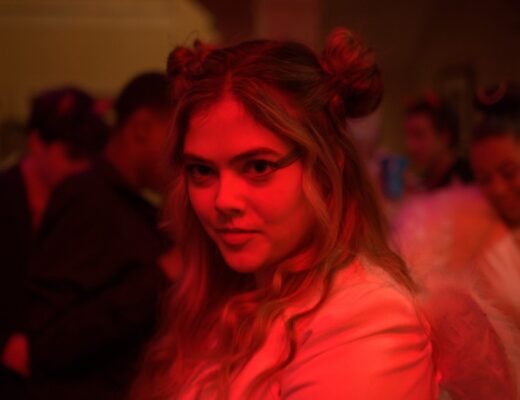Kajillionaire is both July’s most restrained and most maudlin work to date
There’s no denying that Miranda July’s particular idiosyncrasy shares DNA with a number of forgettable, mid-aughts indie comedies, but her weirdo shtick, then and now, is too outré to be regarded as stereotypical quirk. Her two previous films certainly toe the line of twee, but both succeed on her ability to imbue her affective ethos with humanist depth: Me and You and Everyone We Know weaves into its blanket eccentricity threads of acute honesty, and The Future, while less effective overall and decidedly more cutesy, demonstrates a more focused vision and a willingness to abstract her material. Add to all this July’s development as a storyteller — she published her first novel in 2015 — and there was reason to believe that Kajillionaire would represent a further-matured marriage of her emotional and aesthetic sensibilities. Strangely enough, the result is both her most restrained and her most maudlin work to date.
Perhaps a product of July’s sharpened writing skills, the comedic palette of Kajillionaire is its most enticing element, successfully executing both deadpan humor and gonzo surface strokes. A general description of the film easily speaks to the latter: an adult woman wackily named Old Dolio (Evan Rachel Wood) pulls off low-key grifts (a lot of P.O. box theft) alongside her oddball parents, Robert and Theresa (Richard Jenkins and Debra Winger). Old Dolio has straight, witchy hair that frames her face like curtains, the voice of a grumpy male muppet, and generally looks like the missing member of the Lords of Dogtown. She limbos her way along walls with Gumby flexibility so that she can’t be spotted by landlords, and hops concrete blocks like a middle schooler preparing for a career in international espionage. The straight-faced flip side to that brand of humor comes in the form of July’s improved ability with dialogue: in an early scene, when the trio is forced to fly to New York City as part of their hustle, Robert, terrified at the turbulence and attempting to distract himself through conversation, turns to Old Dolio in a panic and asks, “How are you? What are your interests?” It’s not material that’s going to bust anyone’s gut, but it’s an intentionally undemonstrative moment that illustrates the writer-director’s evolved instinct for cutting the strictly oddball with more moderated humor. It doesn’t all work — the consistent images of wonky outsiders navigating the world in a sideways fashion begin to stack up — but the overall impression is of a compellingly diverse comedic style.
Kajillionaire’s major fault, then, is that it’s overly mawkish. The film’s central conflict comes in the form of Melanie (Gina Rodriguez), a normie who is welcomed into the familial fold. Her insertion into this established unit causes conflict between Old Dolio and her parents, giving her both a new ally and a fresh perspective on her circumstance, which amounts to something along the lines of ‘my swindler parents never loved me enough.’ It’s a familiar template, and it only hollows out the film’s emotional core, turning these batty characters into stock ciphers and leaving everything feeling pretty threadbare; the film offers neither substantive pathology nor any real depth, and even the capitalist critique suggested by the title and made explicit in the trailer (“Most people wanna be kajillionaires. That’s the dream. That’s how they get you hooked.”) amounts to nothing here. What does work is Rodriguez’s presence, her naturalism operating both in contrast to and in concert with the kooky family, extending to them both empathy and befuddlement, and grounding them in (a kind of) reality. Scenes of the family playacting at affection, lurching through ill-observed impressions of normalcy, are duly uncomfortable and suggest some latent pathos, but Kajillionaire is a film that is always teetering, and July again upsets its balance in the final third, punctuate this section with such dull platitudes as “People are always in pain.” It doesn’t entirely undo the film’s isolated strengths — such as a sequence in which Robert and Theresa attempt and miserably fail to retain even the tempo, let alone pitch, of “Happy Birthday” — but it’s enough mush to leave the whole affair feeling soft when it should be sharp. July is too talented an artist to produce an outright failure, but given her trajectory and past efforts, it’s hard to perceive Kajillionaire as much more.







